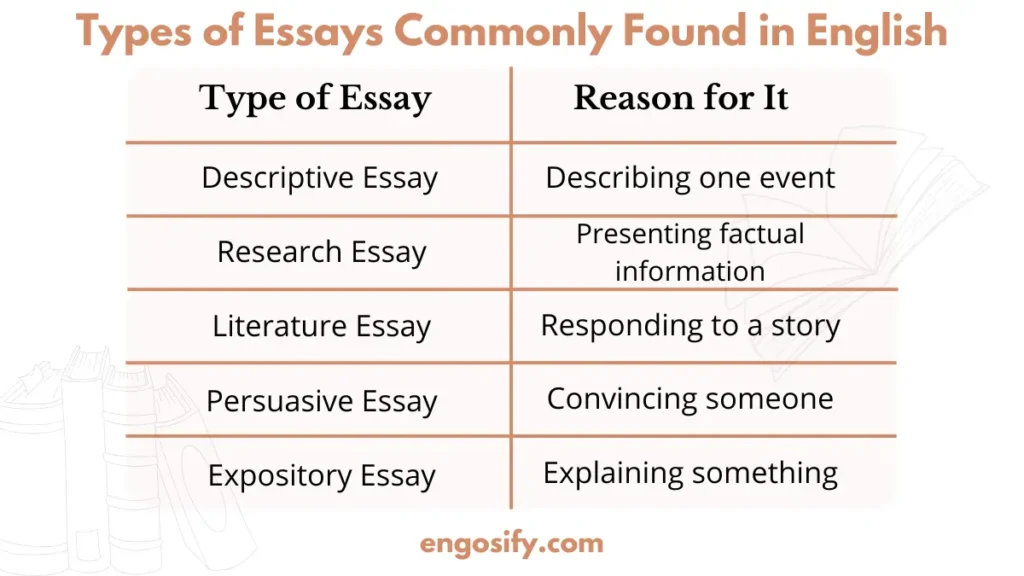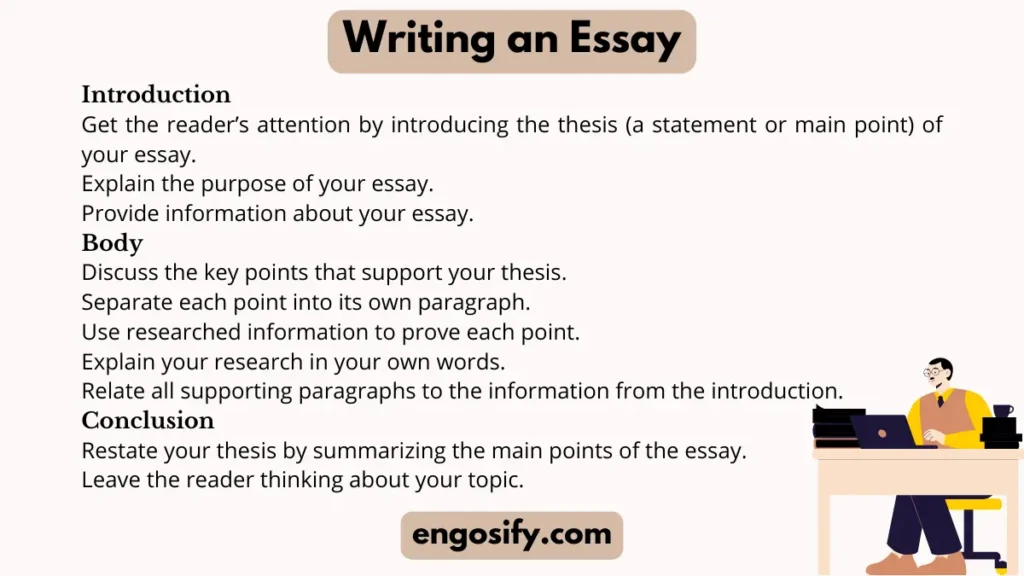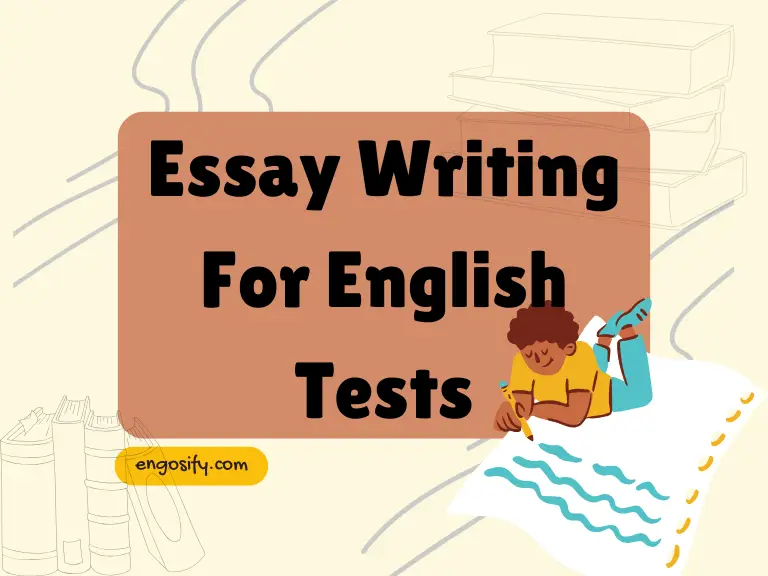Essay writing is a cornerstone of English proficiency exams, and mastering it can make all the difference in your score. From crafting a compelling introduction to wrapping up with a strong conclusion, every step requires focus and precision. In this guide, we’ll dive deep into everything you need to know about essay writing for English tests. Whether you’re prepping for the TOEFL, IELTS, or SAT, these tips will help you tackle essay prompts with confidence and flair.
Understanding the Importance of Essay Writing in English Tests
Overview of English Language Proficiency Exams
English language tests like the IELTS, TOEFL, and PTE often feature essay writing as a core component. Why? Because essays are an excellent way to assess your ability to organize thoughts, use advanced vocabulary, and apply grammar correctly. These exams aren’t just checking if you can write—they’re gauging if you can think critically and communicate effectively.
Role of Essay Writing in Assessing Language Skills
An essay measures much more than grammar or spelling. It evaluates:
- Clarity: Can you express your ideas without confusing the reader?
- Organization: Do your points follow a logical sequence?
- Creativity: Are your arguments compelling and fresh?
- Language Use: Are your word choices precise and impactful?
In English tests, essays often act as a litmus test for your overall language proficiency. They help examiners understand your depth of knowledge, ability to analyze topics, and skills in argument development.
Pro Tip: If you’re preparing for exams like the ACT or SAT, check out Essay Writing Tips for Exams for tailored advice on structuring and improving your essays under pressure.
Types of Essays Commonly Found in English Tests
Recognizing Different Essay Formats
English tests often include diverse essay types to evaluate your ability to adapt your writing style and tone. Understanding the key features of these formats is crucial for crafting effective responses. Let’s break down the common types you’re likely to encounter:
Argumentative Essays
An argumentative essay asks you to take a clear stance on an issue and defend it with evidence. These essays emphasize logic, reasoning, and persuasion. You’ll need to:
- Present a strong thesis statement.
- Use convincing arguments backed by examples or data.
- Address counterarguments thoughtfully.
For example, if the prompt asks, “Should schools implement more technology in classrooms?”, your essay should present a well-reasoned perspective with examples to support your argument.
Descriptive Essays
In a descriptive essay, your goal is to paint a vivid picture of a person, place, event, or concept. These essays rely heavily on sensory details and precise language. While grammar and vocabulary matter, the focus is on creativity and how well you can bring a topic to life.
Expository Essays
Expository essays require you to explain or analyze a topic in a clear, concise manner. There’s no room for personal opinions here—only facts, evidence, and logical explanation.
For instance, a prompt like “Explain the effects of climate change on global agriculture” expects you to stick to facts and present them in an organized manner.
Narrative Essays
Narrative essays let you tell a story, usually based on personal experience. While this type is less common in English tests, some exams might include prompts that encourage creative storytelling. Focus on:
- Clear chronology.
- Emotional engagement.
- A meaningful takeaway or conclusion.
Why Knowing Essay Types Matters
Each essay format has unique expectations, and knowing them will save you time and effort during the exam. Tailoring your response to the specific type demonstrates both your versatility and your command of the language.
Pro Tip: Familiarize yourself with various essay types using resources like Understanding Different Essay Types. This knowledge can significantly boost your confidence on test day.

Understanding Essay Prompts
Analyzing and Interpreting Essay Questions
The first step to acing any essay is understanding the prompt. Essay questions often contain keywords that indicate exactly what’s expected of you. If you misinterpret these instructions, you risk writing off-topic or missing critical points.
Identifying Keywords and Instructional Verbs
Examine the prompt carefully to spot keywords like:
- Analyze: Break down the topic and explain its components.
- Compare: Highlight similarities and differences.
- Discuss: Explore different perspectives on the topic.
- Argue: Take a stance and support it with evidence.
For example, a prompt might say, “Discuss the impact of technology on education.” The keyword “discuss” suggests a balanced exploration of both positive and negative impacts.
Determining the Scope and Purpose of the Essay
Once you identify the keywords, consider the scope of the essay. Ask yourself:
- What’s the main focus?
- How broad or specific is the topic?
- What type of response does the prompt require?
Take the time to brainstorm relevant ideas within the given scope. Staying within boundaries ensures your essay remains concise and targeted.
Tips for Avoiding Misinterpretation
- Rephrase the prompt in your own words. This helps ensure you’ve understood it correctly.
- Highlight or underline keywords. It keeps you focused while writing.
- Ask, “What’s the examiner looking for?” Tailor your essay accordingly.
Pro Tip: Practicing with sample prompts, like those found in Sample ACT Writing Prompts and Essays, can sharpen your ability to decode instructions and respond effectively.
Planning and Structuring Your Essay
Importance of Pre-Writing Strategies
Before diving into the essay, take a few moments to plan. Pre-writing strategies not only save time but also ensure that your essay is clear, cohesive, and engaging. Skipping this step often leads to disorganized thoughts and weaker arguments.
Brainstorming Ideas
Start by jotting down every idea that comes to mind regarding the prompt. Use techniques like:
- Mind mapping: Create a visual layout of your ideas.
- Freewriting: Write freely for a set time without worrying about structure.
- Lists: Break the topic into subpoints or categories.
For example, if your prompt is “How does social media impact communication skills?”, brainstorm both pros (e.g., global connectivity) and cons (e.g., reduced face-to-face interaction).
Creating an Outline
Once you’ve brainstormed, organize your ideas into an outline. This ensures your essay flows logically. A typical structure looks like this:
- Introduction: Hook, context, and thesis statement.
- Body Paragraphs: Each paragraph addresses one main idea with supporting details.
- Conclusion: Recap and closing statement.
An outline acts as your roadmap, keeping you focused and preventing unnecessary tangents.
Structuring the Introduction, Body, and Conclusion
Introduction
Your introduction should grab attention and clearly state your thesis. Include:
- A hook: A surprising fact, question, or statement.
- Background information: Set the stage for your topic.
- Thesis statement: The main argument or purpose of your essay.
For instance: “Social media has revolutionized the way we communicate, but it has also created new challenges for personal interactions. This essay explores its dual impact on modern communication.”
Body Paragraphs
Each paragraph should focus on a single idea. Start with a topic sentence, support it with examples or evidence, and transition smoothly to the next idea. Use phrases like:
- “On the other hand…”
- “Additionally…”
- “For example…”
Conclusion
Summarize your key points and restate your thesis in a fresh way. Leave the reader with a final thought or call to action, such as:
“As social media continues to shape our interactions, balancing its benefits and challenges remains crucial for effective communication.”
Pro Tip: Want to polish your essay structure further? Check out Essay Writing Tips for Exams for expert advice.
Writing the Essay
Crafting Effective Introductions
The introduction is your first chance to make an impression. A strong opening sets the tone, engages the reader, and clearly outlines your essay’s focus.
Hooking the Reader
Start with an attention-grabber to pique interest. Use one of these strategies:
- A surprising statistic or fact: “Did you know that nearly 80% of job recruiters assess candidates’ written communication skills during hiring?”
- A rhetorical question: “Can we truly communicate effectively without mastering the art of writing?”
- A vivid description: “Imagine a world where essays no longer challenge students’ creativity and reasoning skills.”
Presenting a Clear Thesis Statement
Your thesis is the backbone of your essay—it tells the reader what to expect. For example:
“This essay explores the advantages and challenges of social media’s impact on communication skills, emphasizing the need for balance in its usage.”
A clear and concise thesis ensures your essay stays focused and relevant.
Developing Coherent Body Paragraphs
The body is where your ideas shine. Each paragraph should build on your thesis with strong arguments, examples, and seamless transitions.
Topic Sentences and Supporting Details
Start every paragraph with a topic sentence that introduces its main idea. Follow this with details, examples, and evidence to back up your claims. For instance:
- Topic sentence: “One significant benefit of social media is its ability to connect people globally.”
- Supporting details: Explain how platforms like LinkedIn enable networking, or share a case study of how global communities benefit from online collaboration.
Using Examples and Evidence
Make your argument more compelling by incorporating relevant examples:
- Personal anecdotes.
- Statistics or studies (e.g., “Research by XYZ Institute found that…”).
- Historical or contemporary references.
Maintaining Logical Flow and Cohesion
Transitions are essential for readability. Use phrases like:
- “Moreover…”
- “In contrast…”
- “Similarly…”
These help guide the reader smoothly from one idea to the next, maintaining the essay’s coherence.

Writing a Strong Conclusion
The conclusion wraps up your essay, leaving a lasting impression.
Summarizing Key Points
Briefly revisit your main arguments without introducing new ideas. For example:
“In summary, social media has transformed communication, offering both incredible opportunities and distinct challenges.”
Restating the Thesis in Light of the Discussion
Restate your thesis in a fresh way, reflecting on the arguments presented:
“Ultimately, while social media has reshaped how we connect, finding a balance is key to preserving meaningful communication.”
Providing a Thought-Provoking Closing Statement
End with something memorable, such as a call to action, a question, or a forward-looking thought:
“As technology evolves, how will we ensure that human connections remain as authentic as they are instantaneous?”
Common Mistakes to Avoid in Essay Writing
Overlooking the Essay Prompt
One of the most frequent errors students make is straying from the prompt. It’s crucial to:
- Revisit the question periodically while writing.
- Stay focused on the topic and instructions.
For example, if the prompt asks for a discussion, don’t write an argumentative essay instead.
Poor Time Management
Time is limited in English tests, so poor planning can hurt your performance. Common pitfalls include:
- Spending too much time on brainstorming: Allocate a few minutes to organize ideas and stick to the outline.
- Rushing through proofreading: Skipping this step may lead to unnoticed errors.
Tip: Use 20% of your time planning, 70% writing, and 10% proofreading.
Weak Thesis Statements
A vague or overly broad thesis confuses the reader. Avoid statements like:
- “Social media has its pros and cons.”
Instead, be specific:
- “Social media improves global connectivity but can diminish face-to-face communication skills.”
Lack of Organization
Jumping between unrelated points makes your essay hard to follow. Structure each paragraph with:
- A clear topic sentence: Introduces the paragraph’s focus.
- Supporting details: Facts, examples, or analysis.
- A concluding sentence: Wraps up the point.
Overcomplicating Language
Many test-takers think using complex words will impress examiners. However, clarity and precision are more important than showing off vocabulary.
Avoid: “The quintessence of humanity’s digital interactions…”
Use: “The essence of digital communication…”
Ignoring Grammar and Spelling
Grammatical errors can distract the examiner and lower your score. Common issues include:
- Subject-verb agreement mistakes (“He don’t understand” → “He doesn’t understand”).
- Misplaced modifiers (“Running down the street, the tree looked beautiful” → “Running down the street, I saw a beautiful tree”).
Proofread your work to catch these errors.
Forgetting to Use Transition Words
Smooth transitions enhance readability. Phrases like “however,” “in addition,” and “on the contrary” ensure your ideas flow logically.
Writing Off-Topic Conclusions
Your conclusion should tie back to the essay without introducing new arguments. Avoid vague endings like:
- “That’s all I have to say.”
Instead, reinforce your thesis with a final thought or call to action.
Tips for Excelling in Essay Writing for English Tests
Practice Regularly
The old saying “practice makes perfect” couldn’t be more true for essay writing. Dedicate time each week to write essays on various topics. Regular practice helps you:
- Understand different essay types.
- Improve your speed and clarity.
- Identify and fix common errors.
How to Practice Effectively
- Use past exam prompts to simulate test conditions.
- Set a timer to replicate time constraints.
- Seek feedback from teachers, peers, or online communities.
Expand Your Vocabulary
A rich vocabulary enhances the quality of your writing. Focus on learning:
- Transition words (“furthermore,” “in contrast,” “for instance”).
- Academic phrases (“It can be argued that…”).
- Topic-specific terms (e.g., “globalization,” “sustainability”).
Practical Tips for Vocabulary Building
- Read widely: Articles, essays, and journals expose you to diverse language.
- Use flashcards: Tools like Quizlet can help you memorize new words.
- Practice using new words in sentences to ensure understanding.
Master Grammar and Sentence Structure
Grammatical accuracy and variety in sentence structures are key scoring criteria. Focus on:
- Subject-verb agreement: Ensure verbs match the subject in number and tense.
- Sentence variety: Mix simple, compound, and complex sentences for a dynamic flow.
For instance, instead of repeating:
“Technology is useful. It improves learning.”
Try: “Technology is incredibly useful, as it significantly enhances learning experiences.”
Time Management During the Test
Efficient time allocation is crucial. Follow this strategy:
- Plan (5-7 minutes): Analyze the prompt, brainstorm ideas, and outline.
- Write (20-25 minutes): Develop the essay with a clear structure.
- Proofread (5 minutes): Check for grammar, spelling, and clarity.
How to Stay on Track
- Use a watch or timer to monitor progress.
- Avoid overthinking—write as clearly and concisely as possible.
Seek Feedback and Revise
Learning from mistakes is a surefire way to improve. After writing an essay:
- Review it yourself, focusing on structure, clarity, and grammar.
- Share it with someone knowledgeable for constructive criticism.
Stay Calm and Confident
Finally, don’t let test-day jitters get the better of you. A calm mind helps you think clearly and write effectively. Practice mindfulness techniques or deep breathing to stay relaxed.
FAQs
How Can I Improve My Essay Writing Skills for English Tests?
To improve essay writing skills:
- Practice writing essays on various topics regularly.
- Expand your vocabulary with topic-specific and academic terms.
- Review grammar rules and use diverse sentence structures.
- Seek feedback from teachers or peers and apply the suggestions.
What Should Be the Ideal Essay Length in English Tests?
The ideal essay length varies by exam:
- For IELTS, aim for 250+ words.
- For TOEFL, write 300+ words.
- For SAT, focus on developing a comprehensive response without a strict word count.
Always prioritize quality over quantity.
How Can I Avoid Running Out of Time During an Essay Test?
Effective time management is key. Follow this plan:
- Spend 5-7 minutes planning (analyzing the prompt, brainstorming, and outlining).
- Dedicate 20-25 minutes to writing the essay.
- Reserve 5 minutes for proofreading to fix errors and improve clarity.
Practice writing essays within time limits to build speed and efficiency.
What Are the Most Common Essay Topics in English Tests?
Common essay topics include:
- Education (e.g., “The impact of technology on learning”).
- Environment (e.g., “How can individuals contribute to sustainability?”).
- Society (e.g., “The effects of globalization on culture”).
- Personal experiences (e.g., “Describe a time you overcame a challenge”).
Familiarizing yourself with these topics can make test-day prompts feel more manageable.
Conclusion
Mastering essay writing for English tests is an essential skill that can significantly influence your overall score and demonstrate your proficiency in the language. By understanding the different types of essays, carefully analyzing prompts, and implementing effective planning and writing strategies, you can craft well-organized, engaging, and persuasive essays.
Regular practice, expanding your vocabulary, and honing your grammar will not only enhance your writing but also boost your confidence on test day. Remember to manage your time wisely during the exam, ensuring that you have ample opportunity to outline, write, and proofread your essay.
Avoid common pitfalls such as overlooking the prompt or neglecting organization, and always strive for clarity and coherence. With dedication and the right strategies, you can excel in essay writing and tackle any prompt that comes your way. So, gear up, practice consistently, and get ready to impress the examiners with your writing skills!

